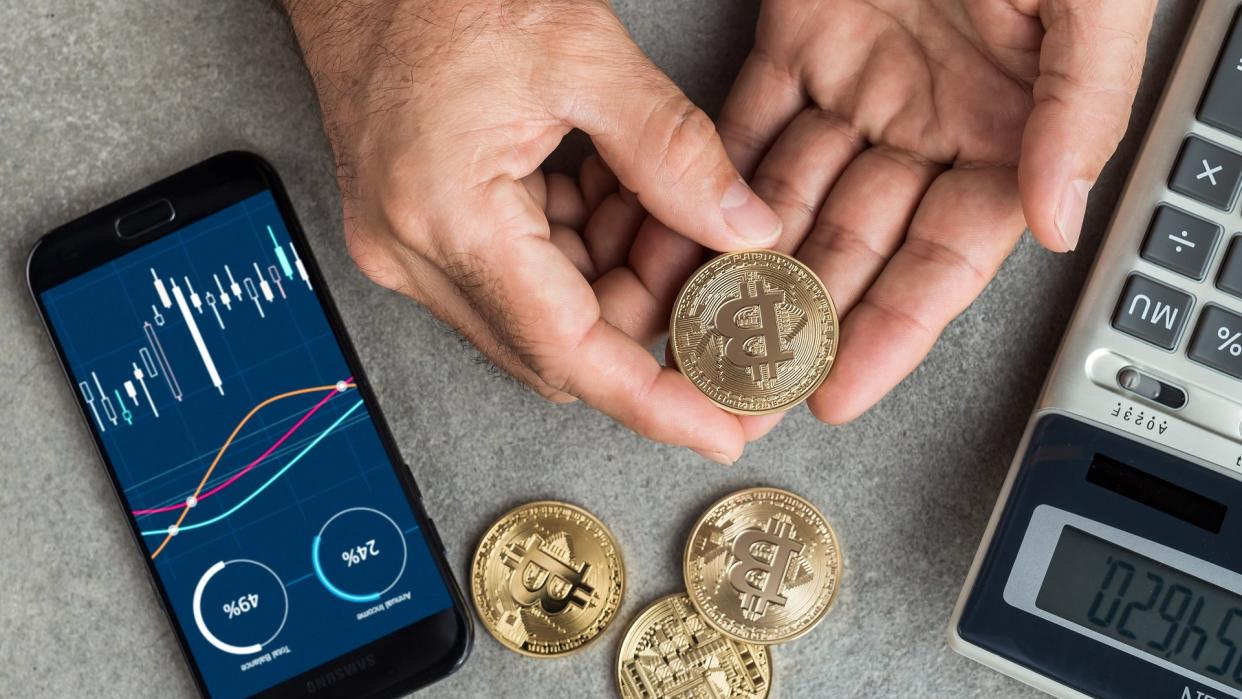36% of Employees Want To Be Paid in Crypto: What Are the Pros and Cons?

An increasing number of employees are interested in being paid in alternative assets, a new survey found. According to research conducted by SoFi, 36% of workers want the ability to receive part or all of their paycheck in cryptocurrency, and 42% would like to receive NFTs as a performance reward.
Look: 25 Things To Sell When You’re Ready To Retire
More: Stimulus Updates To Know for Spring 2022
But is this actually a good idea? There’s a lot to consider, both good and bad.
There’s a Lot To Like About Getting Paid in Crypto
Whether you’re an employee, a freelancer or a small-business owner, receiving the fruits of your labor in cryptocurrency can make getting paid feel even better.
Crypto Payments Are Immediate
When you accept crypto as payment, you cut out the middleman — the bank. That means you don’t have to wait for banks to do whatever it is they do while checks are clearing and direct deposits are pending. With crypto, transactions are immediate.
Cryptocurrency Is En Vogue
Even if you never process a single payment with Bitcoin or Ethereum, just giving your customers or employees the option can be good branding. Crypto is a hot trend and most businesses don’t accept it or make payments with it. That puts those that do on the cutting edge.
Merchants Avoid Credit Card Transaction Fees
Merchants pay transaction fees for the privilege of offering their customers the convenience of using a credit card. If you don’t take plastic, you’ll lose business. If you do, you’ll pay an average of 1.7% to 2.05% per swipe for card-present transactions in 2022, according to Merchant Cost Consulting. Card-not-present transactions cost more, plus, there’s a flat fee, usually about 10 cents per transaction.
Cryptocurrency transactions, on the other hand, can be made for nothing or close to it.
Say Goodbye to Pesky Chargebacks
Chargebacks add an extra layer of protection for customers, but for businesses, these credit card payment reversals are frustrating and expensive. Chargeback fees range from $20-$100 each, according to Verifi, and every dollar lost to chargeback fraud costs $2.40 — each $100 chargeback costs the merchant $240.
Crypto doesn’t offer that kind of protection. Once complete, a crypto transaction can’t be undone so there are no chargebacks.
See: 6 Alternative Investments To Consider for Diversification in 2022
But There Are Plenty of Drawbacks To Consider, Too
It’s not all roses. Cryptocurrency is still unfamiliar to most, not widely accepted and fraught with risks. Before you rush into taking it as payment, consider the following.
The Value of Your Payment Can Change Without Warning
Even with inflation, $1 today will be worth roughly the same in a few days, weeks or even months. Not the case with crypto, an asset class defined by stomach-churning volatility. Bubbles, crashes and wild price swings are the rule, not the exception.
If you had received one Bitcoin to close out last year on Dec. 27, 2021, you would have been paid $50,640.42. Just 11 days later on Jan. 7, your payment would have been worth just $41,557.90 — and that’s not at all unusual. If that had happened with cash it would have meant that society was collapsing.
Your ‘Money’ Is Vulnerable and You’re on Your Own
The reason that merchants get to avoid the headache of chargebacks is that once a crypto transaction is done, it’s done. The customer doesn’t have any fraud protection number to call, there’s no FDIC insurance and Mastercard can’t cancel the transaction.
Crypto crime, hacking and scams are common, and if your account gets hacked or you fall victim to a scam or some other crime, your money is gone for good — because it was never really money.
There’s a Learning Curve and a Tech Curve
Cryptocurrency isn’t regulated by the Securities and Exchange Commission, it isn’t traded on the stock market, it can’t be bought or sold directly in ETFs, and isn’t traded on standard currency exchanges. In order to receive payment in cryptocurrency, you’ll have to open an account and a digital wallet on a special exchange. It’s not hard to launch on a service like Coinbase Commerce, but it is unfamiliar to most.
You Think Taxes Are a Pain Now?
The IRS taxes cryptocurrency holdings as capital assets like bonds and stocks, according to Coinbase. When you buy crypto and leave it in the exchange or in your digital wallet, you don’t pay taxes on it, according to NextAdvisor. But if you use it as a medium of exchange — if you swap it for goods or services, sell it for dollars or trade it for a different kind of cryptocurrency — it’s taxed based on capital gains or losses. If you receive it as payment, it’s taxed as income according to your tax bracket.
If you receive crypto instead of cash as payment, you have to report that cryptocurrency’s value in U.S. dollars as income to the IRS. Keep in mind:
It’s up to you to keep track of every transaction — crypto exchanges rarely send out 1099-B forms.
Crypto pricing is highly volatile — you must report the value of the coin at the time you received it.
Every time you move your coins from a wallet or exchange, it gets more complicated — you must track each transfer.
You’ll probably need specialized professional tax help, at least for the first year.
More From GOBankingRates
Gabrielle Olya contributed to the reporting for this article.
This article originally appeared on GOBankingRates.com: 36% of Employees Want To Be Paid in Crypto: What Are the Pros and Cons?
